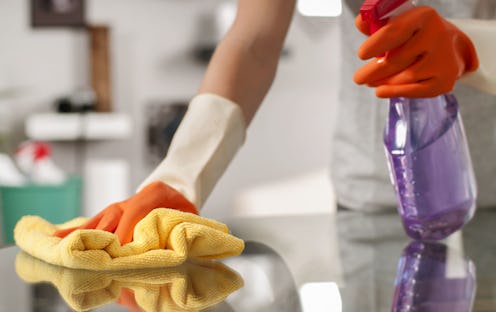Life
Women Who Use Cleaning Products Are More At Risk For This Major Health Issue
It has been approximately eight months since I bothered to bring a vacuum into my room, but though the resulting dust piles mean I wake up each morning with swollen eyes and a stuffed nose, I might actually be doing my health a favor in the long around. Such is the message conveyed by a new study, which says women who clean at home or work might get sicker than women who don't.
In the study, published this week in the American Thoracic Society, researchers at the University of Bergen in Norway, analyzed data focusing on the health of 6,235 participants over the course of 20 years, starting when they were around 34 years old. Researchers already knew that regular exposure to cleaning products could increase one's risk for asthma and/or other respiratory problems in the short term, but there was little research available regarding longterm effects, particularly among people who clean homes and offices for a living and therefore use the products on a daily basis. "While the short-term effects of cleaning chemicals on asthma are becoming increasingly well documented, we lack knowledge of the long-term impact," senior study author Dr. Cecile Svanes told Science Daily. "We feared that such chemicals, by steadily causing a little damage to the airways day after day, year after year, might accelerate the rate of lung function decline that occurs with age."
Svanes and her team's fears were, in fact, realized, with data showing that women who regularly cleaned homes and offices could feel the effects of those cleaning products as much as 10 to 20 years after ceasing to use them, which is troubling, to say the least. Women who cleaned, when compared with women who did not, experienced a decreased ability to forcibly expel air per second, with that measurement down 3.6 milliliters per year for women who cleaned their own homes and down 3.9 ml/year for women who cleaned professionally. The total amount of air they were able to forcibly exhale went down 4.3 ml/year faster for women who cleaned at home, and 7.1 ml/year faster for women who cleaned professionally, than for those who didn't clean.
So, basically, women who were regularly exposed to cleaning products saw a marked decline in the functionality of their lungs — so much so, in fact, that women who worked professionally as cleaners lost the same amount of lung function as people who smoked around 20 packs a year. Researchers said that while they were initially surprised at how harmful the cleaning products were on women's lungs, they believe the heavy chemicals that make up the products irritate the lungs' mucous membranes, which can screw with the respiratory airwaves in the long run.
"The take home message of this study is that in the long run cleaning chemicals very likely cause rather substantial damage to your lungs," Øistein Svanes, another study author, told Science Daily. Svanes notes that cleaners don't necessarily need to use such heavy-duty products to properly clean. "These chemicals are usually unnecessary; microfiber cloths and water are more than enough for most purposes," Svanes said.
So if you do regularly clean and are concerned about cleaning products' long term effects on your health, it is worth considering swapping out cleaning fluids for damp cloths, which should still successfully get grime off your floors and furniture. If you don't think that will be sufficient, the British Lung Foundation suggests looking for products that are labeled "allergy friendly," since those usually have fewer chemicals, and using solid or liquid cleaning chemicals instead of sprays, which put more of the bad stuff into air circulation. It's also important to properly ventilate rooms that you're cleaning, and always follow instructions on the label to prevent unnecessary exposure.
